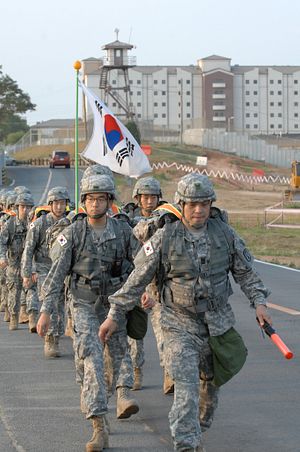Coming on the heels of the mass shooting at a guard post in June, and the suicides of two bullied soldiers in July, the recent arrest of five South Korean military conscripts charged with deadly assault has further eroded the public’s confidence in the conscription system. The arrests were the result of an investigation into the death of a draftee in April, initially announced as asphyxiation but later revealed to have been caused by a blow to the chest. Further fueling the public’s current mistrust of the military, it took investigators three months to disclose the conscript’s true cause of death, raising suspicions that the army had tried to cover up the incident. Attention is now focused on how the government will reform the country’s compulsory military service, where draftees are so clearly prone to abuse.
The response from the Blue House has been to punish officials responsible for both the safety of the conscripts and the investigation into the deadly assault. As a result, Army Chief of Staff Kwon Oh-seong and Chief Commissioner of the National Police Lee Seong-han have resigned from their posts. However, opposition party members have called for an investigation into whether Blue House National Security Office Chief Kim Kwan-jin knew of the details of the assault while he was still minister of defense in April. The new Saenuri party chairman Kim Moo-sung also spoke out and noted that the dismissals alone were not sufficient, given the nature of the crimes.
Indeed, a major overhaul of the way the justice system deals with abuses in the military is in order. There have been several instances where soldiers have stepped forward to expose the deep-rooted culture of abuse in the military, only to have the justice system inadequately investigate these cases or dole out lenient sentences. For instance, in 2013, a former draftee accused a senior soldier of abuse. The cited brutalities included torturing the draftee with a lighter and suffocating him after forcing a gas mask over his head. Although the court found the defendant guilty, it merely fined him 3 million wons (around $3,000) because “the offense was not significant.”
In addition to concerns over human rights abuses, many have noted that these violent behaviors were symptomatic of the army’s falling standards. Noting the incompetence or absence of senior officers in the recent series of incidents, some have highlighted problems in the command structure as a serious shortcoming in the nation’s defense. Others worried that the military’s failure to protect individual soldiers would damage morale at a time when a smaller pool of conscripts are expected to defend the border.
Politically, this is another hurdle for President Park Geun-hye’s cabinet, which faced criticism for failing to properly investigate and disclose the facts surrounding the deadly assault. However, these significant pressures on the beleaguered administration may also lead to constructive changes.
































